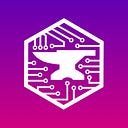How Hacksmiths is Run
We have some very specific ways of organising our 17-person team in Hacksmiths (the student-run tech society at Goldsmiths), which allows us to remain organised and efficient while minimising people’s time dealing with things which aren’t relevant. I felt it was worth popping this into a post, explaining our rationale, and sharing a template which others can pick up and run with.
Our committee
Hacksmiths, like most student groups, is part of our Students’ Union. This means that we are obligated to run fair and open elections for at least three roles — President, Treasurer, and Secretary. Beyond that, the committee may appoint people as they see fit.
We leave those three roles open, and they form the ‘Executive Committee’, along with the (appointed) Diversity & Inclusion Officer, and the Accessibility Officer (a new appointed role we’re trialling). While our team may take care to ensure all of our events are accessible, we want to lay the groundwork for future committees to also have this in their remit through the Officer role.
Everybody else is a General Committee Member. They are given support by the Executive Committee and empowered to become Project Owners for projects they are interested in running (they may already exist, or they may be proposed as new projects). They may also become a Project Supporter, and be involved in projects without taking charge - this is more flexible around their time, and they report into a Project Owner.
As a group we know what everyone’s individual goals and aspirations are, so we can purposefully put people in situations where they can grow.
Sharing information
There are three forums in which we share conversation.
Executive Committee Meetings
These are short, weekly meetings held between the five Executive Committee members. At these, we share the knowledge each of us has gained in the last week — including project progress and concerns. We also make resourcing decisions at these meetings, where we ask the following questions:
- Are enough people working on any given project?
- Do project teams have the skills they need to deliver? If not, how can we upskill our team or provide the skills through other team members?
- How is sponsorship going? May we have to use our general funds?
We are enabled to make these decisions due to our knowledge management workflows (more on this later).
Full Committee Meetings
These happen once a month and involve every member of our committee. As we deal with more specific project concerns in the Executive Committee Meetings, we can save the entire committee from needing a long drawn-out update on every one of our 10 annual projects.
At these meetings, everyone gives a short ‘highlight and lowlight reel’ for their project — talking about wins and challenges they’ve encountered. We also save larger decisions about our group until these, where we may vote on the outcomes. Many of these rely on healthy debate, which I’m very fortunate our group can take part in.
Knowledge Management — Airtable
For those of you who don’t know, Airtable is a mix between an excel sheet and a relational database, and based in the cloud. Every committee member has access to our bases, which contain key information such as:
- Team directory with contact details
- Summary of all projects, including who the team is and their budgets
- Finances (can be broken down per-project)
- Inventory of the items we own
- Relationship management (sponsors, partners, friends)
- Credentials for online accounts (please store your credentials more securely than this)
- Event feedback (both internal and external)
- Data for every attendee who comes to our events, so we can run reports and better understand our impact
Some of this information is immediately useful to certain members of the committee, and while most has no real use for most of our team, they have access to it whenever they want. This transparency and easy access is key to how we run teams.
Our main base, Hacksmiths HQ, stores team directories and finance data. It’s what we use day-to-day to make resourcing decisions, and we’ve created a template version on Airtable Universe which you can copy straight into your account in one click.

